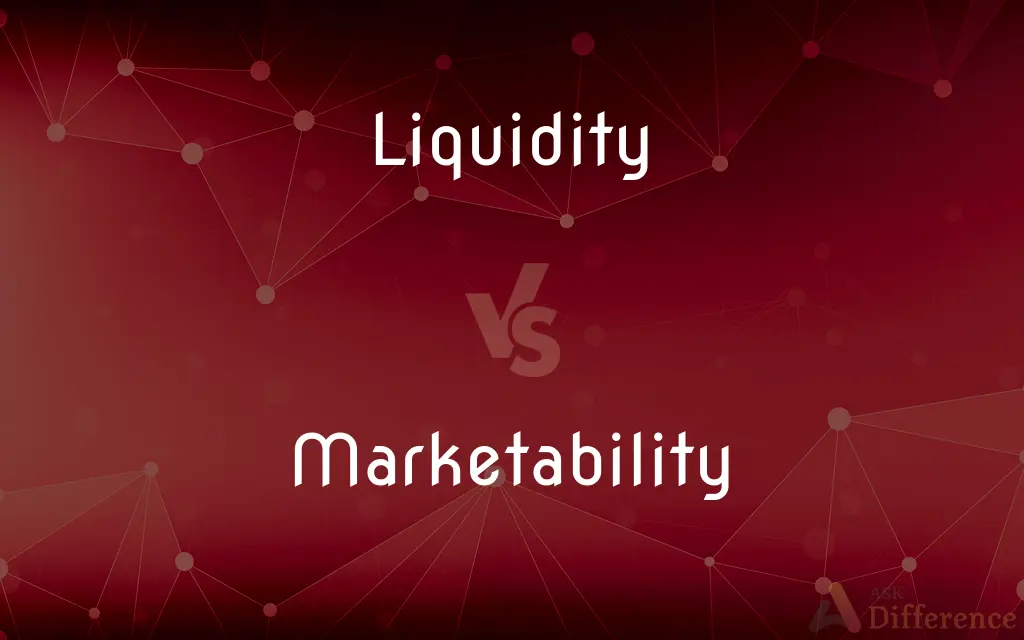Liquidity vs. Marketability — What's the Difference?
Edited by Tayyaba Rehman — By Urooj Arif — Updated on April 14, 2024
Liquidity refers to the ease of converting assets into cash without significant loss, while marketability describes how quickly an asset can be sold at the market price.

Difference Between Liquidity and Marketability
Table of Contents
ADVERTISEMENT
Key Differences
Liquidity is primarily concerned with how quickly and easily an asset can be converted into cash, essential in managing financial obligations. Marketability, on the other hand, focuses on the ease of selling an asset without impacting its price significantly.
A highly liquid asset, like cash, can be used immediately to settle debts or make purchases. Whereas marketability deals with assets like stocks, which can be sold quickly provided there's sufficient buyer interest.
Assets like government bonds are considered liquid because they can be converted to cash swiftly. In contrast, real estate is marketable but may take time to sell, reflecting lower liquidity.
Liquidity is crucial in scenarios requiring immediate financial resources, such as emergency expenses. Marketability is more relevant in planning strategic exits or entries in investment positions.
Financial instruments such as mutual funds offer good liquidity due to their structure allowing quick redemption. However, their marketability is subject to market conditions and investor demand.
ADVERTISEMENT
Comparison Chart
Definition
Ease of converting to cash
Ease of selling at market price
Speed
Immediate to short-term
Can vary widely
Impact on Price
Minimal to none
Can be significant
Typical Assets
Cash, savings accounts
Stocks, real estate
Market Dependency
Low
High
Compare with Definitions
Liquidity
Linked to economic conditions.
Liquidity crunches can signal economic downturns.
Marketability
Can vary by market conditions.
Marketability of homes can drop during real estate slumps.
Liquidity
Essential in financial planning.
High liquidity helps in managing unexpected expenses.
Marketability
Depends on buyer availability.
Marketability decreases in a buyers' market.
Liquidity
Ease of converting assets to cash.
Savings accounts offer high liquidity.
Marketability
Ease of selling assets.
Blue-chip stocks are highly marketable.
Liquidity
Measures cash availability.
Businesses monitor liquidity for operational stability.
Marketability
Influenced by asset characteristics.
Unique artworks have varied marketability.
Liquidity
Affects investment choices.
Investors prefer liquid assets in volatile markets.
Marketability
Important in investment strategy.
High marketability allows for flexible asset management.
Liquidity
The state of being liquid.
Marketability
Fit to be offered for sale, as in a market
Marketable produce.
Liquidity
The quality of being readily convertible into cash
An investment with high liquidity.
Marketability
In demand by buyers or employers; salable
Marketable goods.
Marketable skills.
Liquidity
Available cash or the capacity to obtain it on demand
A bank that is increasing its liquidity by shortening the average term of its loans.
Marketability
The likelihood that something will sell; market appeal.
This is a beautiful house with high marketability.
Liquidity
(finance) The degree of which something is in high supply and demand, making it easily convertible to cash
Liquidity
(uncountable) The state or property of being liquid.
Liquidity
An asset's property of being able to be sold without affecting its value; the degree to which it can be easily converted into cash.
Some stocks are traded so rarely that they lack liquidity.
Liquidity
(finance) Availability of cash over short term: ability to service short-term debt.
Liquidity
The state or quality of being liquid.
Liquidity
The state in which a substance exhibits a characteristic readiness to flow with little or no tendency to disperse and relatively high incompressibility
Liquidity
The property of flowing easily
Liquidity
Being in cash or easily convertible to cash; debt paying ability
Common Curiosities
How does marketability affect investment decisions?
Investors consider marketability to ensure they can exit investments without significant losses.
What does marketability mean?
Marketability indicates how easily an asset can be sold at a price close to market value.
What is liquidity?
Liquidity refers to how quickly an asset can be converted into cash.
Can an asset be liquid but not marketable?
Yes, certain assets like specialized machinery may be liquidated but not easily marketable.
Why is liquidity important for businesses?
It ensures businesses can cover short-term obligations without financial strain.
What factors affect an asset’s liquidity?
Factors include market presence, demand, cash conversion timeframe, and economic conditions.
Are all liquid assets also marketable?
Most liquid assets are also marketable, but the degree of marketability can vary depending on factors like market conditions and asset type.
How can marketability be enhanced for a hard-to-sell asset?
Through marketing efforts, price adjustments, and improving the asset's attractiveness to potential buyers.
How does liquidity differ from solvency?
Liquidity focuses on short-term asset convertibility, whereas solvency concerns long-term financial stability and the ability to meet all liabilities.
Is marketability more important for long-term or short-term investments?
Marketability is generally more critical for long-term investments, as it affects the ease and timing of divesting an investment.
What factors affect an asset’s marketability?
These include the asset's demand, market conditions, uniqueness, and general economic climate.
What role does liquidity play in personal finance?
Liquidity is crucial in personal finance for meeting immediate expenditures and emergency needs.
Does high marketability always mean high liquidity?
Not necessarily; an asset can be quickly sellable (marketable) but may not convert into cash swiftly (liquid).
How can a company improve its liquidity?
By managing receivables, optimizing inventory levels, and securing lines of credit.
Can market conditions turn a liquid asset into a non-liquid one?
Yes, market downturns or disruptions can reduce liquidity even if the asset typically is highly liquid.
Share Your Discovery

Previous Comparison
Color vs. Tone
Next Comparison
Price vs. PrizeAuthor Spotlight
Written by
Urooj ArifUrooj is a skilled content writer at Ask Difference, known for her exceptional ability to simplify complex topics into engaging and informative content. With a passion for research and a flair for clear, concise writing, she consistently delivers articles that resonate with our diverse audience.
Edited by
Tayyaba RehmanTayyaba Rehman is a distinguished writer, currently serving as a primary contributor to askdifference.com. As a researcher in semantics and etymology, Tayyaba's passion for the complexity of languages and their distinctions has found a perfect home on the platform. Tayyaba delves into the intricacies of language, distinguishing between commonly confused words and phrases, thereby providing clarity for readers worldwide.
















































